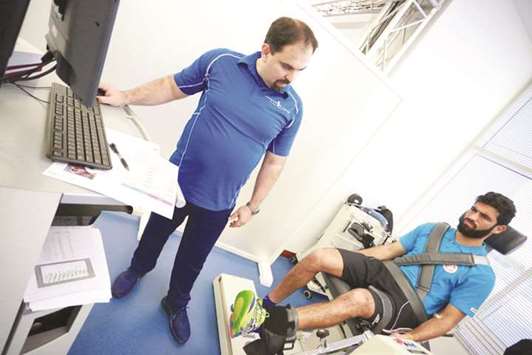The Tunisian national football team has recently concluded a series of medical and performance assessments at Aspetar, the leading specialised orthopaedic and sports medicine hospital, to prepare for the 2018 FIFA World Cup Russia.
Over the course of three days, the so called “Eagles of Carthage” underwent comprehensive medical screening tests and benefited from Aspetar’s extensive experience in injury prevention and enabling athletes to fulfil their potential.
Commenting on the team’s three-day tests at Aspetar, Tunisia’s national team physician Souheil Chemli, said: “The science of sports medicine and performance development are two sides of the same coin, and we are well aware of the world-class facilities and human resources available at Aspetar. Our players have benefited from Aspetar’s scientific expertise in injury prevention and extensive medical follow-ups, which is one of the main reasons behind our decision to choose this hospital as we prepare for Russia 2018.”
Chemli also pointed out that one of Aspetar’s unique selling points is its considerable contribution to international research into the impact of fasting on sports performance, which is particularly relevant for the Tunisian national team given the holy month of Ramadan begins just prior to the start of the FIFA World Cup in Russia.
Commenting on preparations leading up the tournament, particularly during Ramadan, Dr Chemli said: “Many Muslims find it difficult to exercise during Ramadan, but it’s important to note that this is also a month of patience and sacrifice. Exercising during Ramadan is a case of ‘mind over matter’ – and our players are used to training and playing when they are fasting.”
Meanwhile, Tunisian striker Taha Yassine Khenissi said: “We cannot leave anything to chance. We have to consider all aspects of our game – both technical and physical – in order to be fully prepared for the big day and to play in the World Cup.”
“This is my first time in Aspetar, but it is world-class in every sense of the word. I am impressed by the international standards of the facilities and I am proud to have such an organisation in an Arab country. I hope someday to see one similar in my home country.”
The Tunisian striker also praised the hospitality of the people of Qatar and said that this type of support will motivate the team to excel in the World Cup and to instill pride amongst the Tunisian people and all Arab nations.
The Tunisian team will now head to another training camp in Switzerland in March, followed by one other camp before the World Cup begins.
The team will compete in the group stages against Belgium, ranked number five in the world, and England ranked 15th, along with Panama.”
Khenissi described their group as “difficult” and said the players are “aware of the level of responsibility they have, but we will aim to get past the group stages.”
During the team’s physical tests at Aspetar, the Tunisian team defender Khalil Chemmam described the team’s training camp as “outstanding” and said: “We benefited a lot from Aspetar’s expertise in helping us to identify our physical readiness.”
Chemmam pointed out that the comprehensive medical screening provided to the team gave them a clear idea on their fitness levels five months prior to the start of the World Cup competition, equipping them with a clear roadmap to develop their game and improve their performance.
In addition to the comprehensive medical check-ups, a number of players underwent a rehabilitation programme at Aspetar including Amine Ben Amor, who sustained an injury prior to joining the training camp in Doha.
Regardless of an athlete’s level of experience, medical and physical screening can identify any predisposition to injury, such as those at risk of complications from exercise. Examples range from a life-threatening condition such as sudden cardiac arrest, or asthma, diabetes and high blood pressure.
Screening can also involve the use of sport-specific fitness testing to ascertain athletes’ preparation for a particular sport. Since 2007, Aspetar’s Athlete Screening and Sports Cardiology Department has been carrying out these comprehensive assessments. In 2015, Aspetar expanded its services by launching a new clinic dedicated to this purpose to cope with the growing number of professional athletes and physically active individuals who can benefit from its world-class services.
Aspetar’s Athlete Screening and Sports Cardiology Department perform medical assessments on athletes for a variety of reasons. These include assessments ahead of new contract signings, where an athlete can finalize 96% of the tests in one visit.
Each medical assessment consists of different components and is tailored to meet the needs of each individual athlete.
While each test is specific to each individual, a number of components are standard across the board, such as cardiac screening, the detailed medical and injury questionnaire, laboratory tests, dental assessment, biodex muscle assessment, physiotherapy functional assessment, spirometry, visual acuity assessment as well as general medical and musculoskeletal examinations undertaken by an experienced sports and exercise medicine physician.

